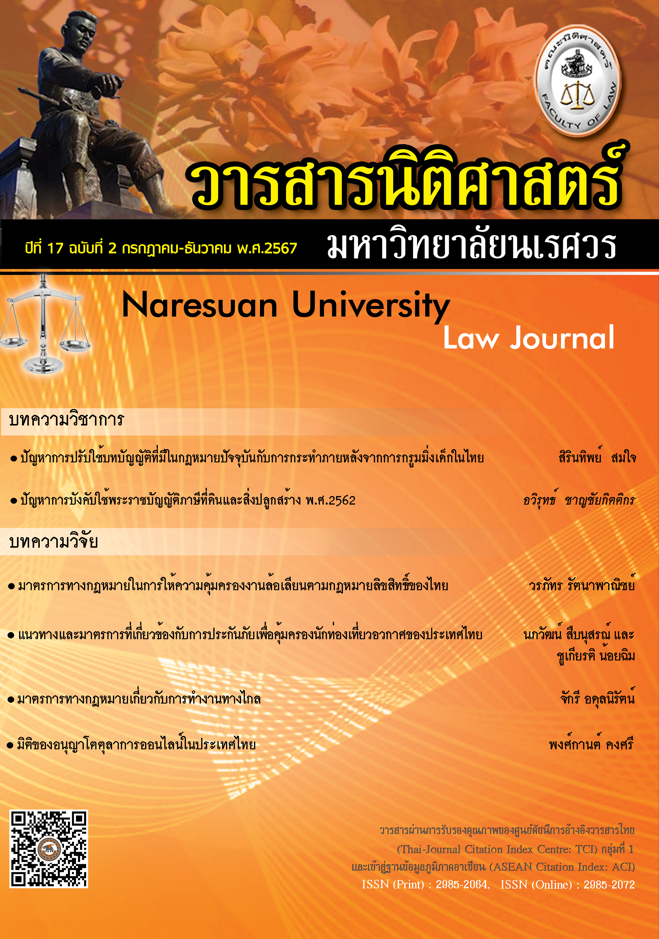Problems on Enforcement of Land and Building Tax Act, B.E. 2562
Main Article Content
Abstract
According to the Land and Building Tax Act B.E. 2562, the tax rate for the use of land and buildings for agricultural purposes is relatively low, and there are exemptions for individual owners of land and buildings used for agriculture within each local administrative organization district, up to an amount of 50 million baht. Consequently, this has raised substantial concerns about the vast amount of tax evasions. According to a study of property tax collection in the state 2523 of Texas, United States, taxpayers must first register their properties for tax assessment, and then the assessor will then conduct property surveys to ensure correctness. In New Jersey, landowners applying for an agricultural land assessment must provide proof of continuous ownership of the agricultural land for at least 2 consecutive years prior to the proposed tax year, with a minimum agricultural area of 5 acres. Additionally, the land must generate average agricultural sales of at least $1,000 per year for the first 5 acres and must remain in agricultural use throughout the proposed tax year. However, if the land is used for non-agricultural purposes, back taxes must be paid. To ensure effective enforcement of the Land and Building Tax Act B.E. 2562 and to increase revenue for local government bodies, Section 11 of the Land and Building Tax Act B.E. 2562 should be amended to require property owners to file a property declaration form before officials conduct inspections for accuracy and issue tax assessment notification letters to taxpayers. Additionally, Section 37, paragraph two, should be amended to ensure that the use of land and buildings for agriculture must involve genuine agricultural activities. Also, Section 40, paragraph one, should include an additional clause specifying criteria for tax exemption for natural persons, who must be engaged in agricultural activities for self-sufficiency.
Article Details
References
Awiruth Chanchaikittikorn. “Land and Building Tax Part 9.” Tax Document Journal 39, no. 465, (2020): 58-63. [In Thai]
Awiruth Chanchaikittikorn. “Land and Building Tax Part 21.” Tax Document Journal 40, no. 477, (2021): 60-65. [In Thai]
Awiruth Chanchaikittikorn. “Land and Building Tax Part 23.” Tax Document Journal 40, no. 479, (2021): 60-65. [In Thai]
Awiruth Chanchaikittikorn. “Land and Building Tax Part 28.” Tax Document Journal 41, no. 484 (2022): 60-65. [In Thai]
Benjamas Inmanee. “Legal Problems Relating to the Expropriation of Immovable Property without Documents of Rights.” Master’s thesis, Laws School of Law Sripatum University, 2019. [In Thai]
Carlson, Richard Henry. “A Brief History of Property Tax.” Fair & Equitable, February (2005): 3-4.
Farmland Assessment Overview, United States, State of NewJersey. Department of Agriculture. New Jersey: Department of Agriculture: Agricultural and Natural Resources, 2015.
Heger, Glenn. “Texas Property Tax, Tax Years 2018 and 2019 (Biennial Property Tax Report).” Texas Comptroller of Public Accounts, December 2020.
New Jersey Department of Treasury, Division of Taxation. New Jersey’s Farmland Assessment Program: A Brochure. New Jersey: Department of Agriculture: Agricultural and Natural Resources, 2016.
Noranit Setthabutr. “Survey of Rural Local Government Areas in America: Jasper County, Texas.” Journal of King Prajadhipok’s Institute 6, no. 1 (2008): 67-77. [In Thai]
Ratchaya Theeralaks. “Problems of Surveying Land and Buildings for Tax Assessment. According to the Land and Building Tax Act, B.E. 2019.” Thesis’s Independent, Faculty of Law, Chulalongkorn University, 2022. [In Thai]
Schilling, Brian J., Kevin P. Sullivan, Lucas J. Marxen, and Margaret F. Brennan. Evaluating Changes in the Eligibility Provisions for Farmland Assessment in New Jersey (Food Policy Institute Report). New Brunswick, NJ: Rutgers, the State University of New Jersey, 2008.
Supalak Phinichphuwadon. Explanation of the House and Land Tax Law. Bangkok: Winyuchon, 2020. [In Thai]
Supalak Phinichphuwadon. Taxation Law. 5th ed. Bangkok: Winyuchon, 2020. [In Thai]
The Ad-Hoc Committee on Land and Buildings Tax Bill. “Minutes of the Meeting of the Ad-Hoc Committee on Land and Buildings Tax Bill, No. 1.” Bangkok Meeting room 310 Level 3 The Parliament Complex 2, 4 April 2017. [In Thai]
Wachara Sookyoy. “Legal Issues Related to Fair Compensation for Expropriated Land.” Thesis’ s Master, School of Law, Sripatum University, 2022. [In Thai]
Weerasak Kruathep. Taxation and State Revenue Administration: Principles and Practices for Public Administration Professionals. Bangkok: Project to Produce Textbooks and Teaching Materials, Faculty of Political Science Chulalongkorn University, 2005. [In Thai]
Weerasak Krueathep, Duangmanee Laovakul, and Kraiwuth Jaikampan. Analysis and Policy Proposals to Improve Land and Building Tax Law B.E. 2562. Bangkok: Chulalongkorn University, 2022. [In Thai]


